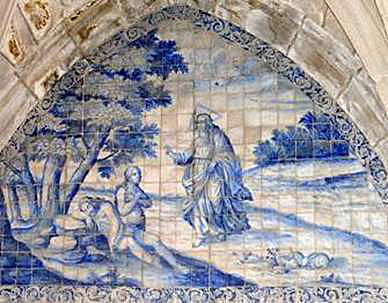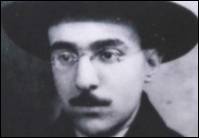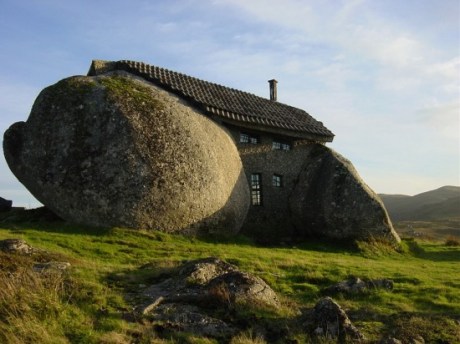Portugal is a rare and hidden jewel with landscapes and terrain that are as diverse as can be found - from beautiful, deserted beaches on the wild Atlantic coast to snowcapped and rugged mountains that protect primeval treasures found deep within the country. Music and poetry are persistently at the center of life, and the people are some of the most gracious and welcoming among us. If you would like to experience the enrichment of depth-psychological exploration within the atmosphere of a generous people, a soulful culture and its uncommon geography, you are invited to consider participating.
NOTE: Regrettably, as of now (March 30, 2013), there are no events currently planned in Portugal. The pictures and text from earlier events below will give you an idea of what's been offered in the past. Please enjoy the images and check back for updates.
 Map of Lisbon (Lisboa) and Cascale by Braun & Hogenberg, 1572-1624.
Map of Lisbon (Lisboa) and Cascale by Braun & Hogenberg, 1572-1624.
Image from Sanderus Antique Maps.
Lisbon
October 15 & 16, 2011
(Postponed until 2012)
Lecture and Workshop
Archetype and Instinct:
The Unity of Spirit and Matter
Psyche and Soma
Course description in Portuguese
 From Wikipedia Commons: God, Adam and Eve in Azulejos
From Wikipedia Commons: God, Adam and Eve in Azulejos
in Coimbras Chapel, Braga, Portugal. Photo by Jose Gonçalves.
Braga
October 2011
(Postponed until 2012)
A Universidade Católica Portuguesa
Catholic University of Portugal
(for registered university students only;
please check back later for details)
![]()
 From Pura Terylene Virgem. Photo by Manoel Pinheiro da Rocha.
From Pura Terylene Virgem. Photo by Manoel Pinheiro da Rocha.
Braga
18 July to 21 July, 2012
3rd International Joint Conference
of the IAJS and the IAAP
University of Braga
Call for papers
deadline October 2011
Presenter:
Cedrus Monte, PhD dipl.
Cedrus Monte is a Jungian Analyst, graduate of the C. G. Jung Institute in Zurich, Switzerland. She currently resides and practices in Zurich, but she is a native of the San Francisco Bay Area (California). She is affiliated with the International School of Analytical Psychology in Zurich (ISAPZurich), where she conducts courses with a focus on body-centered analysis, the creative process and the relationship between psyche, land, and culture. For further information about Cedrus Monte, visit www.cedrusmonte.org.
Dedication

Fernando Pessoa (1888 — 1935) is one of Portugal's greatest writers. His life-long search for meaning, stemming from a continual sense of disquiet and despair, from an ever-present experience of longing, gives us a template from which to better understand the redemptive nature of disquiet and longing in our changing world.
We cannot give into despair; yet we cannot move forward without acknowledging it. To continuously recreate our world, to thrive, we are asked to live within the tensions of paradox: peace is always the partner of disquiet; to learn about wholeness, we need to invite that for which we long; without time for lament, our happiness becomes frenetic, empty. In Pessoa's writing, we find clues to holding the tension of these opposing energies. At turn after turn Pessoa reveals interior landscapes, showing us a view toward their possible, yet uneasy, resolution. His life was in constant tension. He was often in torment. But that he searched and endured and wrote as he did was itself a resolution. He did not turn away from despair; paradoxically, fragilely, he recreated himself within it.
Portugal acknowledges Pessoa as one of its greatest artists, a national treasure. He is buried in the famous Monastery of São Jeronimo in Lisbon along with Vasco de Gama, the fearless oceanic explorer from Portugal's Age of Discovery. Pessoa was also a fearless explorer, of inner worlds. The fact that this quality of fearlessness is also recognized as greatness pays tribute not only to Pessoa, but also to the culture and people of Portugal.
My participation in the activities described on these pages is dedicated to the culture and the people of Portugal, including all my ancestors.
For more information on Portugal,
please visit the Lusitania pages on this website.
